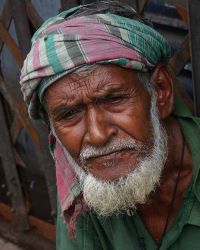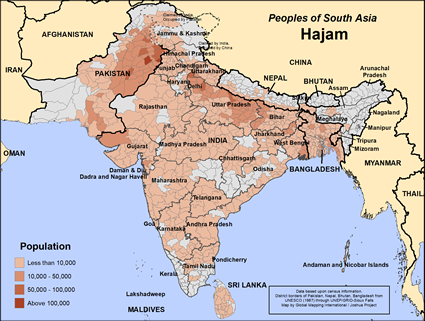Hajam in Pakistan

Photo Source:
Steve Evans - Flickr
Creative Commons
|

Map Source:
People Group data: Omid. Map geography: UNESCO / GMI. Map Design: Joshua Project.
|
| People Name: | Hajam |
| Country: | Pakistan |
| 10/40 Window: | Yes |
| Population: | 2,354,000 |
| World Population: | 4,982,300 |
| Primary Language: | Punjabi, Western |
| Primary Religion: | Islam |
| Christian Adherents: | 0.00 % |
| Evangelicals: | 0.00 % |
| Scripture: | New Testament |
| Ministry Resources: | Yes |
| Jesus Film: | Yes |
| Audio Recordings: | Yes |
| People Cluster: | South Asia Muslim - other |
| Affinity Bloc: | South Asian Peoples |
| Progress Level: |
|
Introduction / History
The Hajams or Hajjams are also known as the Nai Muslims or Turuk Navid in India. There is a long-standing tradition of the Hajam being hair-cutters, barbers and manicurist. The Hajams are found in nearly every part of India and most of Pakistan. In Nepal they can be found in almost any part of the Terai region.
What Are Their Lives Like?
The Hajam remains a respected caste of hair-cutters (hajamat). In some areas the Hajams are the owners of barber shops and salons. In the Muslim community they can often be an active part of the community as hair-trimming for major family events like weddings and funerals can involve them. Even minor ritual surgeries like circumcision can be conducted by some Hajam. In some communities they can also be match-makers and some women assist with childbirth. Though they are Sunni Muslims, married women will often be distinguished by a nose-stud and the "bindi" dot on the forehead. They are not vegetarian and will eat beef with their rice, wheat or maize. In Nepal they speak Nepali as well as Bhojpuri, Urdu as well as Maithili.
What Are Their Beliefs?
The people are Sunni Muslims who believe that the supreme God, Allah, spoke through his prophet, Mohammed, and taught mankind how to live a righteous life through the Koran and the Hadith. To live a righteous life, you must utter the Shahada (a statement of faith), pray five times a day facing Mecca, fast from sunup to sundown during the month of Ramadan, give alms to the poor, and make a pilgrimage to Mecca if you have the means. Muslims are prohibited from drinking alcohol, eating pork, gambling, stealing, slandering and making idols. They gather for corporate prayer on Friday afternoons at a mosque, their place of worship.
The two main holidays for Sunni Muslims are Eid al Fitr, the breaking of the monthly fast and Eid al Adha, the celebration of Abraham's willingness to sacrifice his son to Allah.
Sunni religious practices are staid and simple. They believe that Allah has pre-determined our fates; they minimize free will.
In most of the Muslim world, people depend on the spirit world for their daily needs since they regard Allah as too distant. Allah may determine their eternal salvation, but the spirits determine how well we live in our daily lives. For that reason, they must appease the spirits. They often use charms and amulets to help them with spiritual forces.
What Are Their Needs?
There is a little to no ministry among the Hajams although they are a fairly large Muslim group in Nepal. Even though their community can be slow to adopt new medicine and technology this group remains a strategic people to reach with the Gospel as they have far-reaching connection into the Muslim community socially.
Prayer Points
Pray that the sheer wonder of knowing Jesus and the impact he has on their lives and the joy he brings spur believers to share Christ with the Hajam people.
Pray the hearts of the Hajam people would be stirred by a sovereign work of the Holy Spirit readying them for the time when they hear the gospel message being shared with them.
Pray they will experience dreams and visions of Jesus leading them into a saving relationship with him.
Pray for an unstoppable movement to Jesus Christ among the Hajam people.